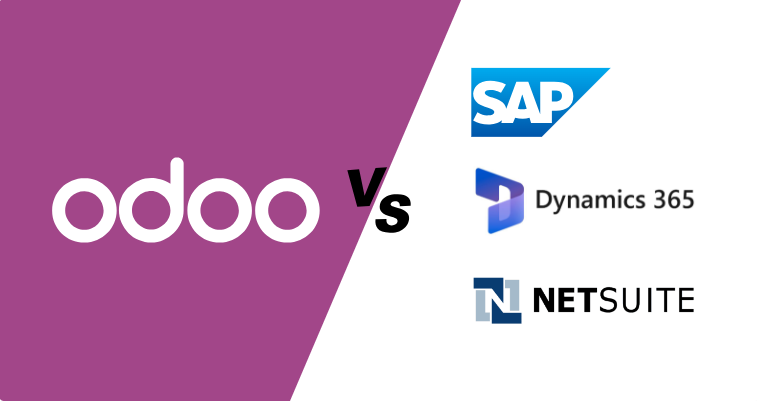Compare Odoo vs ERP systems to find the best solution for your business. Explore features, integration, and scalability for effective management.
As a small or medium-sized enterprise (SME) searching for a reliable and efficient ERP solution, you may find the sheer number of options overwhelming. With so many ERP systems available—each claiming to offer the best features—choosing the right one can be challenging.
Not all ERP software is created equal. Some solutions are designed for large corporations with complex operations, while others cater specifically to the needs of SMEs. Some are user-friendly, while others require significant technical expertise.
Amidst all of these choices, Odoo stands out as one of the most popular ERP solutions for SMEs. But how does it compare to big names like SAP, NetSuite, and Microsoft Dynamics 365? What makes Odoo different, and why should SMEs consider it as their go-to ERP solution for 2024?
Let’s dive deeper and answer these questions so you can see how Odoo could benefit your business in the coming year.
What is ERP?
Before comparing Odoo with other ERP software, let’s clarify what an ERP (Enterprise Resource Planning) system is and why it’s crucial for your business.
An ERP system helps businesses automate and streamline processes such as inventory management, sales, human resources, and accounting. With an ERP in place, your company can operate more efficiently, make data-driven decisions, and enhance customer satisfaction—all of which lead to a stronger return on investment (ROI).
There are two main types of ERP systems:
- On-premise ERP: Installed and hosted on your company’s servers.
- Cloud-based ERP: Hosted and managed by a third-party provider.
Generally, on-premise ERP systems require more upfront costs and ongoing maintenance, while cloud-based solutions are more flexible, scalable, and cost-effective.
Introducing Odoo ERP
Odoo is a cloud-based, open-source ERP solution that offers over 7,300 apps to manage various business functions, including accounting, inventory, CRM, HR, and project management. Odoo’s modular approach allows businesses to start small with just a few apps and add more as they grow.
Additionally, Odoo’s pricing starts at a very affordable $7.25 per user per month, which makes it highly accessible for SMEs. Its flexibility and transparency make it a favorite among small businesses and startups alike.
Why Should SMEs Consider an ERP Solution Like Odoo?
Some SMEs think ERP software is only for large corporations, but this is a common misconception. In reality, ERP solutions offer significant benefits for businesses of all sizes. Here’s how:
- Streamline Business Operations: Automate and integrate core processes like accounting, sales, and inventory to eliminate manual errors and improve efficiency.
- Cost Savings: Optimize resource management, reduce waste, and avoid unnecessary expenses. Cloud-based ERP systems like Odoo also cut down on IT infrastructure costs.
- Increased Productivity: Real-time data and insights help you monitor business performance and make better decisions faster.
- Enhanced Customer Experience: A 360-degree view of your customers allows you to meet their needs more effectively, leading to higher satisfaction and loyalty.
Odoo vs Other ERP Software: 5 Key Differences
To make the best decision for your business, it’s essential to understand how Odoo stacks up against industry giants like SAP, NetSuite, and Microsoft Dynamics. Here are the five key differences:
Target Market:
- Odoo primarily caters to SMEs, startups, and freelancers, offering a scalable, easy-to-use solution.
- SAP, NetSuite, and Microsoft Dynamics are typically designed for larger enterprises with more complex needs.
Pricing:
- Odoo is known for its transparent and affordable pricing, with a free plan for one app and premium plans starting at just $7.25 per user/month.
- SAP, NetSuite, and Microsoft Dynamics offer more complex and often costly pricing structures.
Customization:
- Odoo’s modular design allows you to choose the apps you need and customize your ERP to fit your specific business processes.
- Other ERPs, like SAP and NetSuite, offer fewer customization options and often require more technical expertise.
User Interface:
- Odoo boasts a simple, user-friendly interface that even non-technical users can navigate with ease.
- On the other hand, SAP, NetSuite, and Microsoft Dynamics tend to have more complex, cluttered interfaces.
Functionality:
- Odoo covers all essential business functions and offers unique features like a website builder, point of sale, and email marketing.
- SAP, NetSuite, and Microsoft Dynamics offer similar functionalities but tend to focus on specific industries, such as manufacturing or supply chain management.
Final Thoughts: Why Odoo Stands Out
Odoo is a modern ERP solution that offers a powerful combination of flexibility, customizability, and affordability. Unlike SAP, NetSuite, or Microsoft Dynamics, Odoo is designed with SMEs in mind, offering an ideal solution for businesses that need a scalable, cost-effective ERP system without compromising on functionality.
If you’re ready to explore Odoo for your own business, you can sign up for a free trial on their website. Need help with implementation? Our team of Odoo experts is here to support you at every step of the way.
Follow me on LinkedIn for more updates.
